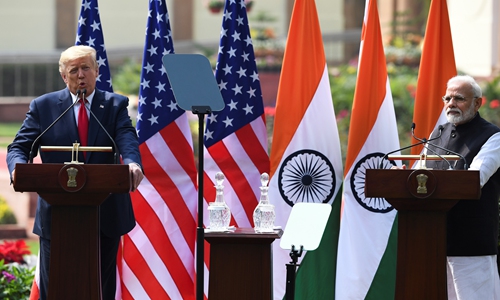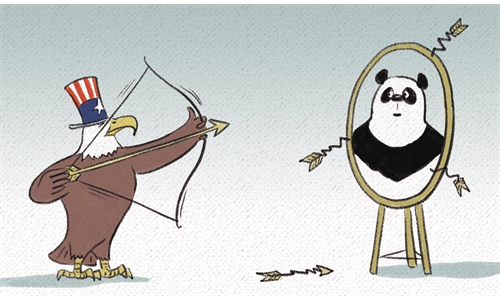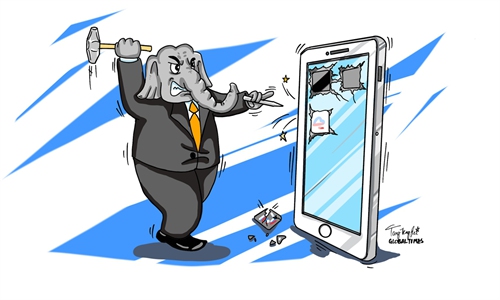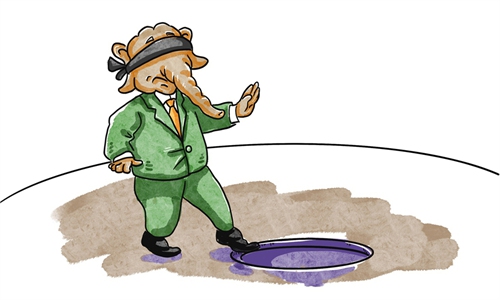Populism will ruin US-India alliance

US President Donald Trump (left) speaks as India's Prime Minister Narendra Modi listens during a joint press conference at Hyderabad House in New Delhi on February 25, 2020. Photo: AFP
Relations between the US and India have been warming in recent years with efforts to forge a so-called alliance of democracies. However, both Washington and New Delhi have performed badly in battling COVID-19. This highlights the shortcomings of their governance capacities. To shift away pressure at home, both the US and Indian leaders are pandering to rising populism and promoting a more conservative and jingoistic foreign policy. But in the long run, populism will lead to the uncertainty of US-India relations. It will also make international cooperation more difficult.
US President Donald Trump's rise to power is seen as a triumph of populism. He enjoys polarizing identity, racial and partisan politics. In India, too, the Modi government has been shifting from nationalism to populism especially after Prime Minister Narendra Modi's reelection.
Put plainly, the US and India are becoming increasingly close as they are both blaming China to shirk their own domestic responsibilities. The US keeps drawing India into its Indo-Pacific Strategy, trying to form a joint force to pressure China. As for the Trump administration, it is struggling to cope with the twin challenges of the epidemic control and economic recession. To increase the pressure on China, the Trump administration has adopted a foreign policy that asks other nations to bash Beijing.
For example, Washington has repeatedly forced its allies - especially the members of the Five Eyes alliance - to follow up on issues such as Huawei, Hong Kong and the South China Sea. Washington now has high expectations that with New Delhi at its side, they can inflict heavy losses on China.
India, driven by populism, has increasingly been pursuing great-power status and sees China as an important strategic rival. This year, it even took advantage of the time when China was busy containing the virus to escalate China-India border conflict, in which New Delhi has paid price of soldiers' lives. After that, there has been a great clamor of boycotting China in India. This petulant boycotting of a large number of Chinese apps and products has already affected normal economic and trade cooperation between the two countries.
The so-called US-India democratic alliance lacks a solid foundation of common interests.
First, the economic and trade cooperation between the US and India is limited and not complementary. Although the US is trying to nurture Indian manufacturing to offset China's, the attempt is clearly impossible to be fruitful in the short term. In addition, the Trump administration is not generous with India in terms of economic and trade policies based on "America First" doctrine.
For example, during Trump's visit to India in February 2020, it was believed that Washington and New Delhi might reach a limited trade agreement. That is to say, India would make trade concessions in exchange for the US to restore or partially restore its designation as a beneficiary under the Generalized System of Preferences. However, no trade agreement was reached.
Second, the Washington and New Delhi appear to have obvious strategic divergences. India has its own pursuit of becoming a great power and has limited strategic trust in the US. New Delhi is relying on Washington to gain a favorable position in the game of great powers, while the US is using the South Asian giant as a lever to balance China and Russia.
Third, the fanatical populism in both countries will make their strategies more conservative and domestically oriented. Relatively, the more populist a country is, the less inclusive it is. This makes it harder to carry out international cooperation.
In short, affected by populism, the so-called alliance of democracies the US and India are trying to forge is unlikely to last. The egoistic nature of populism contrasts sharply with the inclusiveness of a democratic alliance.
Roaring populist movements in the US and India demonstrates the dilemmas facing globalization and international cooperation. It is an expedient move for the two largest democracies to take more advantage of each other. Allowing populism to prevail at home while engaging in beggar-thy-neighbor policies is clearly not in tune with the style of great powers.
The author is secretary-general of the International Security Study Center at China Foreign Affairs University. opinion@globaltimes.com.cn



